|
De Duitse schrijver Alfred Andersch werd geboren op 4 februari 1914 in München. Zie ook alle tags voor Alfred Andersch op dit blog.
Uit:Der Vater eines Mörders
“Nur bei dem Zusammenstoß mit Konrad Greiff ist er aus den Pantinen gekippt, dachte Franz. Wenn sie in den Pausen oder auf dem Schulweg über Kandlbinders Vorsicht sprachen, was nicht häufig vorkam, denn dieser Lehrer nötigte ihnen wenig Interesse ab, gab es immer einen, der achselzuckend bemerkte: »Der will sich bloß aus allem raushalten.«
Der Rex hatte sich der Klasse zugewendet, er trug eine Brille mit dünnem Goldrand, hinter der blaue Augen scharf beobachteten, das Gold und das Blau ergaben zusammen etwas Funkelndes, Lebendiges und jetzt ins Gütige Gewandtes, anscheinend herzlich Geneigtes in einem hell geröteten Gesicht unter glatten weißen Haaren, aber Franz hatte sofort den Eindruck, daß der Rex, obwohl er sich ein wohlwollendes Aussehen geben konnte, nicht harmlos war; seiner Freundlichkeit war bestimmt nicht zu trauen, nicht einmal jetzt, als er, jovial und wohlbeleibt, auf die in drei Doppelreihen vor ihm sitzenden Schüler blickte.
»So, so«, sagte er, »das ist also meine Untertertia B! Ich freue mich, euch zu sehen.«
Er ist wirklich ein Rex, dachte Franz, nicht bloß ein Mann, dessen Titel man im Wittelsbacher Gymnasium auf dieses Wort abgekürzt hatte. Auch in den anderen Münchner Gymnasien wurden die Oberstudiendirektoren Rexe genannt, aber Franz glaubte nicht, daß die meisten von ihnen wie Könige aussahen. Der da schon. Hellgrau und weiß – über dem Hemd lag, tadellos, eine glänzend blaue Krawatte –, mit diesem an den Ecken abgerundeten Visier aus Gold und Blau im Gesicht, stand er vor dem Hintergrund der großen Schultafel, und weder Kandlbinder noch die Schüler schienen Anstoß daran zu nehmen, daß er die Klasse mit dem besitzanzeigenden Fürwort bedachte. Bin ich der Einzige, fragte Franz sich, dem es auffällt, daß er uns so anredet, als gehörten wir ihm?"
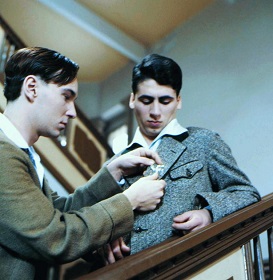
Alfred Andersch (4 februari 1914 – 21 februari 1980)
Scene uit de gelijknamige Duitse film uit 1985
De Moldavische dichter en schrijver Grigore Vieru werd geboren in Pereita op 4 februari 1935. Zie ook alle tags voor Grigore Vieru op dit blog.
Ars Poetica
At dawn, I march ahead
Holding in my arms
The white wreath
Of mother's hair.
After me, it's you, beloved,
Holding in your bosom
The ardent wreath
Of your tear.
At the hind, comes Death.
He carries the scarlet wreath
Of my blood -
He, who never gives anything
Back.
And we all keep marching ahead
Illuminated
By an incomprehensible feeling
Of joy.
Vertaald door Paul Abucean
In deiner Sprache
In gleicher Sprache
Weinen alle Menschen,
In gleicher Sprache
Lacht die ganze Welt,
Aber nur in deiner Sprache,
Man kann den Schmerz lieb lindern,
Und deine Freude
In Gesang verändern.
In deiner Sprache,
Sehnst du dich nach Mutter,
Der Wein wird edler Wein,
Auch Essen lecker ist.
Und nur in deiner Sprache,
Allein du lachen darfst
Und nur in deiner Sprache
Aus Weinen dich ausruhen kannst…
Wenn du nicht weinen
Und nicht lachen kannst,
Wenn du nicht singen,
Und nicht streicheln darfst,
Mit deinem Land,
Mit deinem Himmel vor,
Du schweigst vor allem
In deiner Sprache auch.
Vertaald door Ion Margineanu
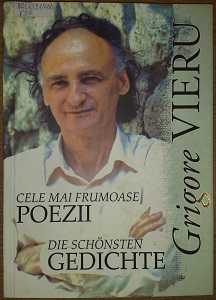
Grigore Vieru (4 februari 1935 - 18 januari 2009)
Cover
De Canadese dichter E. J. Pratt werd op 4 februari 1882 geboren in Western Bay, Newfoundland. Zie ook alle tags voor E. J. Pratt op dit blog.
The Truant (Fragment)
Pulled forward with his neck awry,
The little fellow six feet short,
Aware he was about to die,
Committed grave contempt of court
By answering with a flinchless stare
Tile Awful Presence seated there.
The ALL HIGH swore until his face was black.
He called him a coprophagite,
A genus homo, egomaniac,
Third cousin to the family of worms,
A sporozoan from the ooze of night,
Spawn of a spavined troglodyte:
He swore by all the catalogue of terms
Known since the slang of carboniferous Time.
He said that he could trace him back
To pollywogs and earwigs in the slime.
And in his shrillest tenor he began
Reciting his indictment of the man,
Until he closed upon this capital crime —
'You are accused of staging out of key,
(A foul unmitigated dissonance)
Of shuffling in the measures of the dance,
Then walking out with that defiant, free
Toss of your head, banging the doors,
Leaving a stench upon the jacinth floors.
You have fallen like a curse
On the mechanics of my Universe.
'Herewith I measure out your penalty —
Hearken while you hear, look while you see:
I send you now upon your homeward route
Where you shall find
Humiliation for your pride of mind.
I shall make deaf the ear, and dim the eye,
Put palsy in your touch, make mute
Your speech, intoxicate your cells and dry
Your blood and marrow, shoot
Arthritic needles through your cartilage,
And having parched you with old age,
I'll pass you wormwise through the mire;
And when your rebel will
Is mouldered, all desire
Shrivelled, all your concepts broken,
Backward in dust I'll blow you till
You join my spiral festival of fire.
Go, Master of the Revels — I have spoken.'
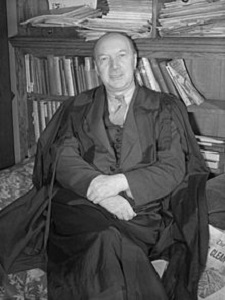
E. J. Pratt (4 februari 1882 – 26 april 1964)
De Deense schrijver, criticus en filosoof Georg Brandes werd geboren op 4 februari 1842 in Kopenhagen. Zie ook alle tags voor Georg Brandes op dit blog.
Uit: Recollections Of My Childhood And Youth
“The trying moment of the day was when he had to go to bed. His parents were extraordinarily prejudiced about bedtime, just when he was enjoying himself most. When visitors had arrived and conversation was well started--none the less interesting to him because he understood scarcely half of what was said--it was: "Now, to bed!"
But there were happy moments after he was in bed, too. When Mother came in and said prayers with him, and he lay there safely fenced in by the tall trellis-work, each bar of which, with its little outward bend in the middle, his fingers knew so well, it was impossible to fall out through them. It was very pleasant, the little bed with its railing, and he slept in it as he has never slept since.
It was nice, too, to lie on his back in bed and watch his parents getting ready to go to the theatre, Father in a shining white shirt and with his curly hair beautifully parted on one side Mother with a crepe shawl over her silk dress, and light gloves that smelled inviting as she came up to say goodnight and good-bye.
I was always hearing that I was pale and thin and small. That was the impression I made on everyone. Nearly thirty years afterwards an observant person remarked to me: "The peculiarity about your face is its intense paleness." Consequently I looked darker than I was; my brown hair was called black.
Pale and thin, with thick brown hair, difficult hair. That was what the hairdresser said--Mr. Alibert, who called Father Erre: "Good-morning, Erre," "Good-bye, Erre." And all his assistants, though as Danish as they could be, tried to say the same.
Difficult hair! "There is a little round place on his crown where the hair will stand up, if he does not wear it rather long," said Mr. Alibert.
I was forever hearing that I was pale and small, pale in particular.
Strangers would look at me and say: "He is rather pale." Others remarked in joke: "He looks rather green in the face." And so soon as they began talking about me the word "thin" would be uttered.”
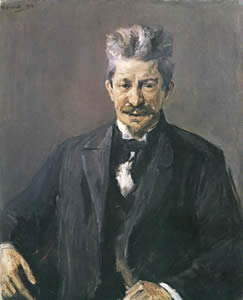
Georg Brandes (4 februari 1842 – 19 februari 1927)
Portret door Max Liebermann, 1902
De Franse dichter Jacques Prévert werd geboren in Neuilly-sur-Seine op 4 februari 1900. Zie ook alle tags voor Jacques Prévert op dit blog.
Presque
A Fontainebleau
Devant l'hôtel de l'Aigle Noir
Il y a un taureau sculpté par Rosa Bonheur
Un peu plus loin tout autour
Il y a la forêt
Et un peu plus loin encore
Joli corps
Il y a encore la forêt
Et le malheur
Et tout à côté le bonheur
Le bonheur avec les yeux cernés
Le bonheur avec des aiguilles de pin dans le dos
Le bonheur qui ne pense à rien
Le bonheur comme le taureau
Sculpté par Rosa Bonheur
Et puis le malheur
Le malheur avec une montre en or
Avec un train à prendre
Le malheur qui pense à tout ...
A tout
A tout ... à tout ... à tout ...
Et à tout
Et qui gagne "presque" à tous les coups
Presque
Chanson de l'oiseleur
L'oiseau qui vole si doucement
L'oiseau rouge et tiède comme le sang
L'oiseau si tendre l'oiseau moqueur
L'oiseau qui soudain prend peur
L'oiseau qui soudain se cogne
L'oiseau qui voudrait s'enfuir
L'oiseau seul et affolé
L'oiseau qui voudrait vivre
L'oiseau qui voudrait chanter
L'oiseau qui voudrait crier
L'oiseau rouge et tiède comme le sang
L'oiseau qui vole si doucement
C'est ton coeur jolie enfant
Ton coeur qui bat de l'aile si tristement
Contre ton sein si dur si blanc
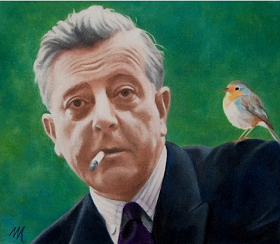
Jacques Prévert (4 februari 1900 – 11 april 1973)
Portret door Mario
De Franse dichter en schrijver Jean Richepin werd geboren op 4 februari 1849 in Médéa, Algerije. Zie ook alle tags voor Jean Richepin op dit blog.
Ballade du rôdeur des champs
Nul ne peut dire où je juche :
Je n’ai ni lit ni hamac.
Je ne connais d’autre huche
Si ce n’est mon estomac.
Mais j’ai planté mon bivac
Dans le pays de maraude,
Où sans lois, sans droits, sans trac,
Je suis le bon gueux qui rôde.
Le loup poursuivi débuche.
Quand la faim me poursuit, crac !
Aux œufs je tends une embûche :
Les poules font cotcodac
Et pondent dans mon bissac.
Puis dans une cave en fraude
Je bois vin, cidre ou cognac.
Je suis le bon gueux qui rôde.
Quand j’ai sifflé litre ou cruche,
Ma cervelle est en mic-mac ;
Bourdonnant comme une ruche,
Mon sang fait tic-tac tic-tac.
Alors je descends au bac
Où chante quelque faraude
Qui me prend pour son verrac.
Je suis le bon gueux qui rôde.
Envoi
Prince au cul bleu comme un lac,
Cogne dont l’œil me taraude,
Pique des deux, va ! Clic, clac !
Je suis le bon gueux qui rôde.
La flûte
Je n’étais qu’une plante inutile, un roseau.
Aussi je végétais, si frêle, qu’un oiseau
En se posant sur moi pouvait briser ma vie.
Maintenant je suis flûte et l’on me porte envie.
Car un vieux vagabond, voyant que je pleurais,
Un matin en passant m’arracha du marais,
De mon coeur, qu’il vida, fit un tuyau sonore,
Le mit sécher un an, puis, le perçant encore,
Il y fixa la gamme avec huit trous égaux ;
Et depuis, quand sa lèvre aux souffles musicaux
Éveille les chansons au creux de mon silence,
Je tressaille, je vibre, et la note s’élance ;
Le chapelet des sons va s’égrenant dans l’air ;
On dirait le babil d’une source au flot clair ;
Et dans ce flot chantant qu’un vague écho répète
Je sais noyer le coeur de l’homme et de la bête.
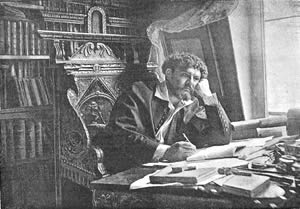
Jean Richepin (4 februari 1849 – 12 december 1926)
In 1893 gefotografeerd door Dornac
De Zweedse Rokoko-dichter en componist Carl Michael Bellman werd geboren op 4 februari 1740 in Stockholm. Zie ook alle tags voor Carl Michael Bellman op dit blog.
Cradle-Song For My Son Carl
Little Carl, sleep soft and sweet:
Thou'lt soon enough be waking;
Soon enough ill days thou'lt meet,
Their bitterness partaking.
Earth's an isle with grief o'ercast;
Breathe our best, death comes at last,
We but dust forsaking.
Once, where flowed a peaceful brook
Through a rye-field's stubble,
Stood a little boy to look
At himself; his double.
Sweet the picture was to see;
All at once it ceased to be;
Vanished like a bubble!
And thus it is with life, my pet,
And thus the years go flying;
Live we wisely, gaily, yet
There's no escape from dying.
Little Carl on this must muse
When the blossoms bright he views
On spring's bosom lying.
Slumber, little friend so wee;
Joy thy joy is bringing.
Clipped from paper thou shalt see
A sleigh, and horses springing;
Then a house of cards so tall
We will build and see it fall,
And little songs be singing.
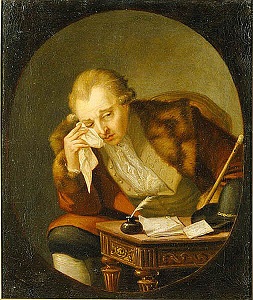
Carl Michael Bellman (4 februari 1740 – 11 februari 1795)
Portret door Pehr Hilleström, 1781 (mogelijk 1790)
|



